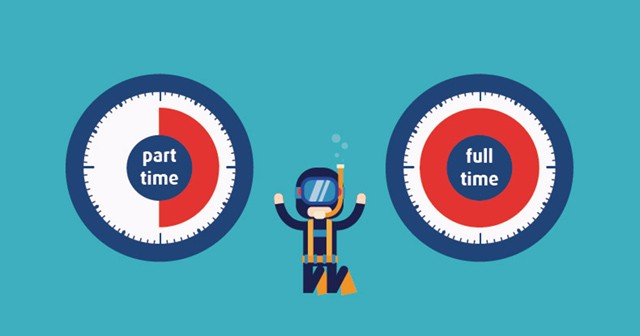What is the difference between part time and fulltime? The number of hours worked is the primary distinction between part-time and full-time employees. Full-time employment is typically defined as 30-40 hours per week, whereas part-time jobs are defined as less than 30 hours per week. To know more about its differences, let’s take a look below!
What is a full-time job?

The Fair Labor Standards Act (FLSA) was revised by Congress in 1940 to limit the workweek to 40 hours. This gradually established itself as the norm for determining whether a job is full- or part-time.
Since then, the term "full-time" has been interpreted variously by various government agencies. The Bureau of Labor Statistics, for example, defines "full-time" as 35 hours or more each week.
The Affordable Care Act defines "full-time" as working 30 hours a week on average. The Fair Labor Standards Act, on the other hand, makes no mention of numbers and simply declares that the regulations apply to both part-time and full-time work schedules.
It's crucial to realize that none of these definitions are enforceable in court. The FLSA amendment, which sets a 40-hour workweek maximum, is the sole law now in force.
Furthermore, that doesn't preclude your staff from working more than 40 hours each week. Simply put, they are eligible for overtime if they do.
This provides employers a lot of leeway in defining what "full-time" means to them. While some firms insist that a full-time employee must put in a 40-hour workweek, others set a lower bar of 35, 32, or even 30 hours.
Read more: Benefits of Internal Recruiting
Benefits of full-time job
Benefits for employees | Benefits for employers |
While there is no legal need that employers provide full-time workers with perks like paid time off (unless they are ALEs) and health insurance, they tend to be more prevalent in full-time roles.
Full-time workers, particularly those in salaried roles, put in more time at the office, which results in higher pay. |
Full-time employees can execute more extensive duties like management or inventory tracking because they spend more time at work.
Full-time job generally fosters greater commitment and engagement due to the increased rewards associated with it. |
Disadvantages of full-time job
Employees' Disadvantages | Employers' Disadvantages |
More hours, more responsibilities, and higher demands can leave full-time employees feeling overwhelmed, exploited, or simply tired of their jobs.
Due to their longer workweeks, people may feel that they cannot maintain a healthy work-life balance. |
We're repeating ourselves because pressing full-timers too much can kill the goose and reduce their productivity and engagement for businesses.
You could have to pay them extra for their labor and provide health insurance due to the ACA's provisions for overtime compensation. |
What is a part-time job?

An employee who works part-time does so less frequently than full-time. Sure, this is a hazy term, but it shows how flexible you are as an owner to decide what suits your company.
It's critical to properly define part-time vs. full-time in accordance with the needs of your organization because, as you'll see in the next section, a part-time job is frequently ineligible for obtaining some benefits.
Benefits of part-time job
Benefits for employees | Benefits for employers |
Working fewer hours and days per week may provide employees with more energy overall.
Without needing to have a lot of experience, part-time workers can explore various careers and find the ideal workplace without committing to a full-time arrangement. |
Your bottom line will be directly impacted by part-time hiring since you will spend less on salary, benefits, and other costs. The money you save can be used to improve other elements of your firm, such as inventory, staff optimization, or business growth.
Scheduling is more flexible for part-time workers. Because they can sporadically add part-time workers to fill in gaps, managers frequently find it simpler to construct personnel rotas as a result. |
Disadvantages of part-time job
Employees' Disadvantages | Employers' Disadvantages |
While some organizations provide benefits to part-time employees, it is not as popular as it is for full-time employees.
They may be viewed as more expendable because employers do not have to spend as much on them.
Part-time employees are frequently kept "on call," which means they must be available for work at all times but are not given a set schedule. |
Part-time workers may not be as invested in the workplace culture or as driven to meet organizational objectives because they spend less time there.
Part-timers could feel less obligated to the requirements of their company because there is less participation and dedication on both ends.
Part-time work schedules increase the number of employees that managers must monitor, train, and communicate with on a regular basis. |
Key factors of Part-Time and Full-Time Worker

Overtime Regulations
Your company's part-time compared to full employee overtime policies are at best hazy. It ultimately comes down to whether an employee is classified as exempt or nonexempt.
A person who satisfies the following requirements is considered an exempt employee by the federal government:
- Has increased responsibility.
- Salary-based compensation (not hourly).
- Earns at least $35,568 each year.
- Exempt employees are not eligible for overtime. Contrarily, non-exempt workers satisfy the following requirements:
Hourly or salary pay
- Reaches at least the federally mandated minimum wage.
- Has fewer responsibilities.
- This kind of worker is capable of receiving overtime pay.
That may not appear to be tough, but when you factor in part-time vs. full-time employment, things become a little more complicated.
Employee Onboarding: Full time job and part time job
You will onboard all employees, whether they be part-time, full-time, or a combination of the two, in the same manner.
While every company's onboarding procedure will be different, they all have the following fundamental elements:
- Begin the process prior to the new employee's first day.
- Prepare your crew for the newcomer.
- Set criteria for the new employee.
- Before the employee arrives, prepare their workplace.
- Choose a simple day to start the new employee.
- Make them feel at ease.
Recruiting Part-Time vs. Full-Time Workers
Finding full-time versus part-time staff requires the same steps.
Most likely, you've discovered resources that are useful for your company, but there are still some straightforward and practical alternatives you might consider:
- Placing signs or fliers.
- Collaboration with nonprofits.
- Current employees are being asked to spread the message.
- posting job descriptions on online employment boards.
- Using Facebook and Twitter to reach out to potential employees.
- Including a "Careers" page on your website.
- Whatever method you choose to recruit new employees, make sure to thoroughly interview them to determine whether or not they are a good fit for your company.
Employing Both Types Of Workers
Some firms benefit by hiring a combination of part-time and full-time staff, while other organizations suffer.
Only hiring part-time workers is the business model for several sectors. On the other side, some industries discover that hiring solely full-time workers increases productivity.
With a detailed understanding of how your business operates, you'll be able to determine the appropriate number of part-time vs. full-time personnel to hire to keep things moving smoothly.
Employee Scheduling
Scheduling part-time vs. full-time personnel with anything less than the greatest software complicates your job significantly.
Because it includes elements that other applications do not, the Tanca suite of tools is ideal for constructing even the most challenging sorts of schedules.
The Tanca app includes the following features: powerful and straightforward scheduling.
- Complete time tracking.
- Productive labor cost reduction.
- Overtime control is beneficial.
- Payroll processing that saves time.
- Communication that is adaptable.
- Cloud-based distribution that is adaptable
- Reporting that is dynamic.
- Budgeting that works.
Read more: What Is An Advantage Of Hiring Contingent Workers?
Is it better for you to work part-time or full-time?

That is ultimately determined by your priorities. A part-time employment can be a better option for you if you are enrolled in school and must be present for classes throughout the day.
Part-time work can also be a terrific option to maintain your career while taking care of the family if you have childcare obligations or are taking care of an aging parent. If you'd prefer to work many part-time jobs than one full-time employment, that's also a possibility.
Full-time employment, on the other hand, may be your best alternative if you desire a higher wage or better benefits and can devote the majority of your weekday daytime hours to work.
FAQs: What Is The Difference Between Parttime And Fulltime?
Which is best part-time or full-time?
If you'd prefer to work many part-time jobs rather than one full-time employment, that's also a possibility. Full-time employment, on the other hand, may be your best alternative if you desire a higher wage or better benefits and can devote the majority of your weekday daytime hours to a work.
Does part-time mean 4 hours?
Many part-time jobs have hours ranging from 5 to 35 hours each week. The Fair Labor Standards Act (FLSA) is a federal legislation that requires a national minimum wage, overtime compensation, and the prohibition of child labor. However, it does not provide a definition of part-time work.
Does part-time pay more than full-time?
Your employer is required by law to provide equal compensation for equal effort. When performing the same job, part-time and full-time employees should be paid the same hourly rate.
How long should you stay at a part time job?
The majority of professionals concur that you ought to commit to working there for at least two years. It's a sufficient amount of time to increase your knowledge and credentials while being brief enough to demonstrate your commitment to professional development.
Read more: Fair Compensation For Beginners
Wrap up
So now you know What Is The Difference Between Parttime And Fulltime. In your employee handbook, make sure to include all of this information regardless of if you hire part-time workers, full-time workers, or a combination of the two.
Each employee will be aware of what to anticipate from their employment with you and where to search for answers to frequently asked questions as a result.
Additionally, keep your employee handbook up to date on a regular basis. During a staff meeting and the onboarding process for new workers, go through it with long-time employees. When you accomplish that, there won't be any ambiguity regarding full-time versus part-time employment.
Visit Tanca right away for other free tools that will help you run your company more effectively, manage and schedule your crew, and track and estimate labor expenditures.





